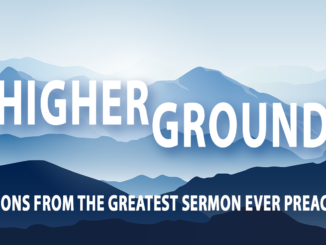
By Randy Harp, Director, Baptist Bible Fellowship International Central Office, Springfield, MO
Read Matthew 5-7.
What is the best sermon you have ever heard? Maybe it was a sermon that revealed a biblical truth you had never understood before. Or maybe it was a sermon that connected with you on an emotional level when you were going through a difficult time. Or maybe it was a sermon that pushed you out of your comfort zone and challenged you to do something specific. The greatest sermons will accomplish all three. They will speak to your intellect and to your emotion as they challenge you to live in a way that pleases our Lord. Jesus delivered a sermon that did just that. Over the next 35 days, we are going to look at lessons from the greatest sermon ever preached. In it, we will discover Jesus’ message of a counter-cultural life that is just as relevant today as the day it was delivered.
Within these chapters, we are called to embody a righteousness that surpasses merely external behaviors and delves into the depths of our hearts. Click To TweetIn Matthew 5-7, Jesus delivers profound teachings that challenge and transform our perspective on life. Within these chapters, we are called to embody a righteousness that surpasses merely external behaviors and delves into the depths of our hearts. In Matthew 5:20, Jesus sets the stage for this call to higher ground, saying, “For I say to you, that unless your righteousness exceeds the righteousness of the scribes and Pharisees, you will by no means enter the kingdom of heaven.” Here, Jesus challenges the superficial righteousness of the religious leaders of that time and invites them and us to dig deeper beyond mere legalistic actions and focus on our heart’s condition—a righteousness that is rooted in love and authenticity.
The Sermon on the Mount is very carefully structured.
- The nine Beatitudes (5:3–12) and the salt and light metaphors (5:13–16) form the sermon’s introduction.
- Matthew 5:17–20 provides the thesis statement of the greater righteousness required of Jesus’ disciples.
- Matthew 5:21–48 contrasts Jesus’ teaching with the law by means of six antitheses.
- Matthew 6:1–18 contrasts true and hypocritical piety by means of three examples.
- Matthew 6:19–34 turns to social issues, with various commands regarding money and true riches.
- Matthew 7:1–12 gives three further commands on how to treat others.
- Matthew 7:13–27 concludes the sermon with three illustrations of the only two possible responses to Jesus’ message.[1]
Jesus chose His words carefully in the 109 verses that make up this great sermon. One could argue that some of the most popular verses in all of the New Testament are found in this text. Over the next 35 days, we will examine several topics such as the Beatitudes, the golden rule, how to pray, the importance of being a positive witness and example, loving our enemies, dealing with anxiety, and building our lives on a solid foundation. One consistent theme you will find as you study the Sermon on the Mount is the consistent challenge to live counter-cultural to the world in which we live. This was true when Jesus delivered the sermon approximately 2,000 years ago, and it is still true today. Thus, the title of this devotional … Higher Ground.
One consistent theme you will find as you study the Sermon on the Mount is the consistent challenge to live counter-cultural to the world in which we live. Click To TweetSo, let us embark on this pursuit of higher ground rooted in the teachings of Jesus. Let us strip away the pretense of external righteousness and allow His Spirit to transform our hearts, minds, and actions. As we stand firmly on the rock of His truth, our lives become a testimony to the world of His incredible love and righteousness.
Reflective Questions:
- What are you hoping to gain from this study of the Sermon on the Mount? Write down at least three areas where you hope to grow.
- How do you hope to grow in your knowledge of God and His Word?
- How do you hope to grow in your emotion and compassion toward others?
- How do you hope to grow in your action and live out His truth?
Memory Verse:
For I say to you, that unless your righteousness exceeds the righteousness of the scribes and Pharisees, you will by no means enter the kingdom of heaven. Matthew 5:20
Prayer:
Dear God, thank you for Your Word. Thank You that this great sermon was recorded so I can still read it today. Help me over the next several weeks as I study Your Word to grow closer to You. Help me to understand and apply Your Word to my life.
[1] Craig Blomberg, Matthew, vol. 22, The New American Commentary (Nashville: Broadman & Holman Publishers, 1992), 95–96.


Good stuff Randy! Thanks for sharing!